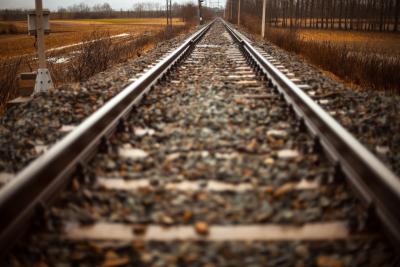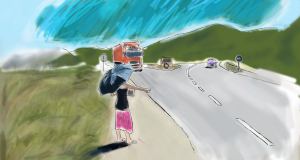
This article was sent to us. We don't encourage breaking the law in any country. Use tips provided here at your own risk.
Free travel is the right of every person on the planet; why is movement restricted? One's right to live a nomadic lifestyle is impeded by invisible borders, passport control and a monetary system that doesn't favour the poor.
Many borders exist around the world, but without the right papers or passport you will not be allowed to set foot past the imaginary, man-made borderlines. Here in Europe, borders have been dissolved and unrestricted, making travel to neighbouring countries something that recent generations have become accustomed to. I myself have grown to love travelling, and I like to think that on my low income I have made the most of free travel around Europe.
When I tell people that I have travelled to different parts of Europe, they usually assume, or ask, if I flew. This question always makes the same feeling rise up inside me, a feeling of anger and confusion, I feel like saying “why the fuck would I fly?, air travel is extremely bad for the environment and I was in no rush to get to where I was heading ” - though I am usually too polite to phrase it like this.
If they haven't assumed that I flew, people often ask, “oh so how did you get there?” I reply, “you know, a bit on the train and some hitch-hiking”. Their response to this depends on which part of my answer they latch onto, if they picked up on hitchhiking, their response is generally along the lines of, “oh that can be dangerous, you better watch yourself doing that”. Alternatively, if they focus on the train travel it's common for people to say “oh that must have been expensive!”. Knowing that I hardly ever buy a ticket to travel always makes me smile, but my response is always to the tune of, “ yes train tickets are very expensive and especially for the service that you get! Late, over-crowded trains that are dirty and old, running on tracks that are short of repair and all this off the back of privatization. We were promised better trains, more routes and more jobs, but what we've got from this private business is rising ticket prices, staff cuts and huge bonuses paid to the rail network executives”. Every person that I tell this to always agrees with me that train tickets are over priced and that the rail system would be better off in the hands of the public sector, run for the people by the people, for service and not for profit.
If ticket prices were fair and the rail network was an affordable public service for the all of the people and not just those that can afford it, then I would buy a ticket. Until that time I see not buying a train ticket as a form of protest against privatization, an act of civil disobedience.
Free train travel laws
Due to the privatization of railways, the legalities regarding travelling without a ticket have changed. Pre-privatization it was much easier for penalties to be issued because government bodies dealt with administration and transport police were there to enforce the rules. Post-privatization, the previous laws used to prosecute passengers without a ticket no longer applied and the new owners, being private businesses, no longer had the weight of the law on their side. This means that if you get fined you don't legally have to give railway staff any details and you don't have to show them any identification. If you choose not to hand over your details they may call the police, issue a fine or throw you off at the next train stop.
If the police are called you don't have to worry because travelling without a ticket is not a criminal offence and if you refuse to identify yourself, the only thing the police are legally obliged to do (in the UK) is to escort you from the railway premises. However, the railway staff do have the right to prosecute you under trespass laws, so it is always best to remain calm and friendly and not to piss them off - acting in this way reduces the chances of them taking the incident any further.
The laws vary from country to country but in Europe, generally the majority of train lines are privately-owned, operating under private business rules (although this may be subject to change). Specific laws in countries other than the UK will be discussed and outlined later on.
Free train travel and technology
Technology has changed Europe's railway networks a great deal in the last 25 years, with billions being invested on security features like CCTV, with little budget for spending on improving the tracks and trains or creating jobs in other areas of the railway. With evermore security features cropping up on stations, it's becoming harder to travel for free and for some people too daunting to even try.
Whenever I come to a new station, be it huge like Paris Nord or tiny like Praia Ancora in Portugal, I always find it useful to sit and watch for a while. I like to find a nice seat, somewhere where you can see the train departure board and the ticket barriers and where you can watch the flow of the station and look for possible hazards or entry points to the platform from where you need to depart.
CCTV has moved on a long way in the last 20 years, from grainy black and white cassette recordings to digital face recognition able to pick out a single face from thousands of commuters. With this new technology, security may be able to screen and recognise known ticket “offenders”, stopping them from entering the station, as well as cameras on board the train being able to relay live information back to security camera operators. Several times now as I have tried to leave a station without a ticket and failed, the person that stopped me has asked me to look up at a camera, so that they had a record of my facial measurements. I am a little concerned about this, I am actually quite interested and looking forward to testing out the effectiveness of theses cameras, to see if they aid catching people or it is just hot air designed to scare people into buying over priced tickets.
Ticket barriers, especially in the UK, are commonplace even on small train stations. This not only poses a problem to travellers without a ticket, it also makes thousands of people redundant. Instead of small stations being managed by a team of 2 or 3 staff members, they have been substituted for an automated ticket machine, ticket barriers and CCTV cameras. Nowadays there is only automated customer service and no staff on hand to deal with emergencies, or even to help with simply tasks like booking tickets for those who struggle to operate or understand the machines. This is not the type of system I want and most certainly not one I am willing to pay for and contribute to.
Getting through ticket barriers
There are many ways to get through ticket barriers, and every time you succeed is a victory. It is easy to board trains at some stations, for example in France there are very few ticket barriers on the SNCF platforms, although on board the trains the conductors are a lot more active and it is very tough to avoid being checked, especially on long journeys.
In the UK, most stations have barriers that pose a small problem when entering stations ticketless. If you have some money you can always buy a ticket to the closest station to the one you are at and then try to avoid the guard on the train, if the guard sees you and you have bought a ticket for just one stop, try showing them the ticket and a small percentage of the time they won't check it properly and you can get away with your full journey. If the guard checks and realises, you will probably get thrown off of the train at the next stop (unless you can convince them to let you carry on travelling) and need to begin the process again from the station you end up at – though luckily you can miss out negotiating ticket barriers as you will already be on the platform.
Ticket barriers in the UK generally have 2 or 3 modes of entry or exit depending on which way you are going:
- The main entry is the automated barrier in which you insert a ticket to pass through; with these barriers it is possible - if you are quick - to pass through behind another passenger. With people getting fatter it wouldn’t surprise me if they have to increase the time that barriers stay open for, even if only for a couple more seconds, all the better for free travellers and possibly the only thing I may ever thank fast-food for!
- The second way to enter the platform is via the luggage entrance, which is by far the easiest to get through. The barrier for the luggage entrance stays open longer after someone has inserted their ticket, making it easy to pass through unnoticed. It is my preferred method, although not all stations have these type of luggage gates, and as long as there is no guard you should be able to pass through with little trouble.
- The third option to enter the platform only applies to bigger stations that have a large row of ticket barriers. On the flanks of the barriers there are generally staff gates which are sometimes left unattended and open making it easy to slip through. Sometimes, when it is very busy in the morning or evening rush hour these gates are opened to ease traffic and the train staff don’t have enough time to check every ticket properly, so it's quite easy to find an old ticket on the floor and wave it in front of the inspector's face whilst sandwiched between commuters.
A favourite trick of mine, if I have found an old ticket on the ground and I am carrying my bags, is to put the ticket in my mouth and as I make my way towards the inspector act as though I am fumbling with my bags and have my hands full, as I walk through I offer the inspector the ticket from my mouth. Not once has this method failed me and not once has the inspector taken the ticket from my mouth and checked it. One time I had to do it with half of a train ticket (the good end poking out between my lips) as it was the only thing I could find coming off of the train from Brighton into London Victoria. It helps if you try not to see ticket barriers as impenetrable, but rather as a challenge, a hurdle to be leaped - quite literally sometimes.
Dealing with conductors
Every time I bunk through I get an adrenaline rush. When I see a train guard walking down the train carriage towards me my heart races, I try to hold my nerve and not look suspicious. I often see other people that are clearly travelling without a ticket; their constant glances up and down the carriage and nervous disposition give them away.
Suspicious, unnatural behaviour draws attention and can even cause conductors to make a bee line straight for you. It has worked in my favour in the past when the ticket inspector has walked straight past me and asked to see a guys ticket. Who had got up from his seat and stood by the door way before the train reached the station and was looking pretty suspicious. I remained calm and walked away to the other end of the train away from the conductor.
When travelling with no ticket it is imperative to be alert and ready to deal with a number of different scenarios, if you do not think quickly and act fast you may not even make it aboard a train.
It's always a good idea to have stories in your head ready to tell and a certain degree of role play may be required when faced with obstacles like guards at a ticket barrier. Remember, make your stories good, many train staff have been in the job for a long time, they have heard all manner of excuses and stories from all sorts of people trying to travel for free.
Luckily, in France the SNCF is still largely a socialist organisation and the conductors use their discretion to judge and deal with passengers who can't afford the full fare. Many times on the SNCF network I have seen other passengers negotiate the amount they can afford to pay for a ticket. The passenger and ticket guard come to an arrangement on the amount to be paid; for this, France and the SNCF has my respect.

Wait it out in the toilet
The toilet option: the lowliest form of train hopping. Some travellers, including myself at times, result to sitting in the toilet for the duration of the journey. It is an effective method and often works without a glitch but it is not a nice environment and is not much fun unless you are in there with a friend or partner. The toilet can be used in short bursts; often you don't have much choice as the angry knocks on the door get harder and more frequent from the growing queue of weak-bladdered commuters waiting to use the loo. It can be a bit embarrassing and amusing to walk out of the toilet with your travel buddy, but really there's little likelihood you will see any of the toilet queuers ever again, so walk out confidently and nonchalant and most people won't bat an eyelid.
Take a seat
If you're lucky you can take a seat and watch to see the conductor moving up the train, keeping your eye on the ticket inspector's movements and roughly working out how fast they're making their way down the carriage. As they approach within a few seats from yours, calmly stand up from your seat, walk to the toilet and sit in there for five minutes or so; as long as you think it will take them to pass by your seat. Check the coast is clear by peeking out the door and walk back to your seat. You may have to repeat this action more than once on a long journey but it means you get to travel in a bit of comfort and not sat on a toilet seat.
Free Travel at peak times
It takes quite a long time for a penalty fair ticket to be written out and in the UK there is generally one conductor to check all passengers are clear when closing doors. So, it can be very difficult for the conductor to check every ticket at busy times. Travelling for free at peak times is recommended as there is less chance of being seen and pulled out from the crowd. Although, with face recognition technology perhaps we could see this change in the near future.
On the flip side, with the introduction of more barriers and CCTV monitoring all areas of stations, there has been a reduction in the number of train conductors that travel aboard trains in the UK. Therefore, once you have made it through the barriers and on to the train, it is likely you will not see a conductor for the whole journey. Train staff call trains without a conductor NCA's (no conductor aboard) and they are becoming evermore common, a blessing for the frugal traveller.
Free fines
If you are unable to avoid the train conductor whilst travelling without a ticket, then you will likely be fined. In some situations and in particular countries, it is best to comply with the train guard and divulge your details. They will ask you for your name, date of birth, address and ask to check your ID. In most countries, train conductors travel with mobile devices, which allows them to relay the information they take from you and cross reference it against several data bases almost instantly. They check that the address given is correct and issue you a fine.
Do not worry, you are under no obligation to pay the fine! It is not a legal matter and will not be enforced by law. However, they will try and use scare tactics (and/or lies) to make you pay the fine immediately, these include: threats of police involvement and arrest, threats that you wont be able to continue your journey and even threats of prison if the fine is not paid. Don't panic, you don't have to pay, you haven't done anything wrong, although they will make you feel like you have committed a serious crime.
Feel confident at this stage in your argument that you are travelling without a ticket as a protest against privatization, for a cheaper, improved service and as a greener alternative to car travel. I've had times in England where the police have been called but I have never been prosecuted, all that has happened is that i've been escorted out of the station by the police. Within about 20 minutes I am back on the train, after some 3-ball juggling outside the station to earn enough money to buy a ticket to the next train station - my pass through the dreaded ticket barriers. In one instance the onlooking train guards clearly knew I was going to travel further than the ticket I'd just purchased but they were powerless to act as I was acting in accordance to the rules – as I passed I smiled and acknowledged them and thanked them for their help.
Contact from rail companies and bailiffs
Letters from bailiff companies and trick phone calls are tactics they use to scare you into paying fines (this obviously only applies if you have given your correct details to the person that issued the fine). A favourite method, and a sneaky one at that, used by the UK rail companies, is to send a letter to the address you provided when issuing the fine, saying that you have received a telegram and need to call this number in order to receive it. Please do not fall for this underhand tactic! If you call the number, and confirm your name, you have provided a positive link between your name and current address. Come on, who sends telegrams these days? If you receive any mail corresponding to the event just throw it away, don't even read it, it will cause unnecessary worry.
If the train company continues with prosecution, you may receive a visit from the bailiffs, but again don't worry, they do not have the right to enter your property as the fine is deemed a civil matter, not a criminal matter, thus they are denied power of entry by the courts. (UK)
If you are not registered in the country where the fine is issued and even if you have given your correct details, ID and passport number, you wont have to pay the fine. Half of the time it will get sent to the wrong address anyway and they do not have a system in place to collect debts outside of their own country. If you are travelling without money, be apologetic when being fined, say you are sorry and you are travelling without money and that you are trying to travel home and have no other way, the conductor will generally issue you a fine or ask you to leave the train at the next station. If luck is on your side and your story good the conductor may let carry on with the journey.
Providing false details
Some people take the option of giving the conductor false information (which I believe is illegal). If you are prepared with an alternate name, address and date of birth which correspond to a real person, there is a chance you can get away with it, though you have to spin a believable story about why you don't have ID on you, and it's luck of the draw whether the conductor will accept your story or chooses to involve the authorities.
If you use a friend's details and they have contact from the rail company regarding the fine, they can deny it was them and use CCTV to prove so. My own brother has given my details a few times which resulted in letters from various debt recovery agencies, none of which have ever lead to any legal action and I have never paid a single fine.
How I started to travel for free
I have been travelling free on European trains for over 20 years now, beginning with my mischievous days at high school when I had to travel from my home town to a neighbouring town to get to school. I would spend my fare money on a packet of Marlborough lights and be forced into bunking the train to and from school. The journey was only about 15 minutes so it was quite easy and in those days there were no ticket barriers and no CCTV.
It was on one of these journeys to school that my friend and I decided to go on further. We passed the stop that would leave us short walk to school and stayed on the train heading west towards Devon in south west England. In fact, at the time we didn't know where we were heading, but carried on regardless, past Chichester and Portsmouth towards Southampton, dodging the guard as he made his way down the train.
In those days, when I was about 14 or so, the trains in England were the 'slam door' stock, meaning that the train doors were not electric, you had to reach out of the window and turn a handle to open the door. There weren't as many safety features back then either and you could open the door whilst the train was moving. This allowed for the game we called “train surfing” where you would ride the open door onto the approaching platform.
On these older trains there were still remnants of the previously well-defined class structure; some of the train carriages had first and second class personal compartments, generally used by business men in their grey suits on the way to work. When these compartments were empty they made great hiding places to dodge the guard, as you could climb up on to the luggage rack, on the side that the guard was approaching from and hide. 9 times out of 10 they wouldn’t notice the foetal working class lad curled up on the 1st class luggage rack and would walk straight past.
We used this method of avoidance and others but we also got thrown off a few times. We slowly made our way up to Bristol and then down through Somerset towards Devon. It was late by the time we reached a small station in the middle of somewhere and neither of us had informed our parents or schools of our maverick excursion. We sat around the station for a while and found out that there was only one more train running that day; a Great Western service to London Victoria. So when the train eventually pulled up to the station we boarded and started towards London. The guard came round to us quite quickly and by this point we couldn't be bothered to hide or lie to him about why or where we were travelling. The guard obviously noticed that we were young and tired and didn't bother us for the rest of the journey.
The train pulled into London Victoria at about 1am and there were no more trains running to Brighton until 6am. We spent a few hours trying to sleep on benches and walked up to Buckingham Palace, where we greeted the Queen's staff by blowing raspberries through the palace gates, much to the humour of us tired 14 year olds. We boarded the first train back to our home town and I remember walking back to my house from the station as people were making their early morning commute to work. We had completed more than a 500 mile free trip - in more than one sense of the word - and my eyes had been opened to the realm of possibilities when one isn't restricted by the price of a ticket.
The debit card trick
Something I've learnt on my travels, is that a UK debit card (not credit card) doesn't work to make direct purchases outside the UK; you can only take money out at an ATM. This can work in your favour when confronted with a train conductor asking to see your ticket. I politely and naively ask to purchase a ticket on board the train, and offer my debit card as payment. You can tap in your pin confidently in the knowledge that it will not work (please test that your debit card doesn't work to make payments before giving your pin for an expensive rail ticket, if it works your plan is scuppered!)
When the ticket machine rejects the card, you can act shocked, assuring the inspector that there is money on there, and that you don't carry cash as it's dangerous when travelling. There are a few outcomes to this:
- The best outcome is that the conductor will think their machine is broken, try a few times, and then apologise to you and let you off the fare!
- They might be intolerant and ask you to leave at the next station to purchase a ticket from the platform ticket machine (sometimes protesting that their machine is at fault and not you can lead to them giving up and allowing you to complete your journey – it's worth a try)
- They might issue you a fine; it's best to act shocked and saddened by this, put yourself in the mindset that your card really isn't working and you don't have any cash, and act accordingly. Please see 'free fines' section on how to deal with train fines.
There is also another possibility that could arise from this trick, it's one that happened to me and my girlfriend when riding the trains from Amsterdam to Porto. After spending the night on a Belgian train station and waking up at sunrise to catch the first train to Lille, France, we decided to give the debit card trick a go.
When confronted with a debit card that was being repeatedly rejected, and two passengers without any cash between them, the Belgian conductor began to get annoyed and agitated. He spoke very little English, and in French told us that we needed to find a way to pay for our journey. His frustration soon spilled over into full blown anger, and he forcibly yanked the debit card from my girlfriend's hands and made off down the aisle muttering inaudibly in French.
At this point I joined him in feeling angry; you cannot walk off with somebody's bank card, regardless of the situation - that in itself is illegal. The guard was ranting about calling the police and that we were going to be in big trouble. We told him he could call the police, that was fine, but that he needed to give us back our card. He didn't understand my south-east England accent, so I preceded to shout “je voudrais mon credit card” without a hint of the romantic French accent, still in my thick southern tongue.
Eventually, at the next stop, he escorted us, still gripping onto my girlfriend's card, to the on-site police officer. He explained his side of events to the officer, who listened intently, before turning to us to allow us a moment to portray our side of the story – luckily he spoke very good English. Once I finished telling him how the conductor had forcibly removed the bank card from my person, the officer grabbed the card from the conductor, gave it back to my girlfriend and told him that it was unacceptable and actually illegal to move someone's bank card out of their sight! More satisfying than getting away scot-free with our train hop, was the look on the conductor's face; a picture of utter dismay and astonishment at being made to look like a jobs-worth without a clue.
Free train travel conclusion
Travelling is fun and opens your eyes to new places, cultures and people, but it's restricted by a financial system that favours the rich. Travelling without a ticket - or moneyless - is not a crime; it is a protest, an act of civil disobedience against privatization. There is a chance that you may get into trouble with the law and there is a chance that you will get fined. If you are worried about these then maybe you should stick to hitch-hiking, where there is much less chance of getting into legal trouble.
For those of you that hitch-hike and are familiar with the way of the road, then you will know that the lifts that you get don't always take you in the right direction, often you will get taken off route and may struggle to get picked up again. With free train travel you know where you are heading and you know that if you get aboard a train you are heading somewhere. Even if you only get one stop, its one stop closer to your desired destination. If you get aboard Inter-city trains then 100-200km is guaranteed and depending on your luck and how early you start it is easy to cover long distances in a single day.
Always remember to check the laws in countries, especially with regards to showing ID to officials and police. In some countries when asked by the police you have to show them identification or you can be arrested. Remember though, always be polite and humble when confronted with train staff or police and don't worry about paying fines and stuff, they are not legalities. It may effect your credit rating and you may receive letters from courts, just ignore them. I have never paid a fine and don't ever intend to. My personal circumstances probably vary from yours, as when I was younger I borrowed some money from some banks and never paid it back. So my credit rating is out of the window and having outstanding debts and fines causes me no concern.
If, however, you are not ready to step out of the credit system and are worried you might not be able to get a contract telephone or credit for a mortgage, then don't travel without a ticket! It may cause problems in the future.
If you are a nomadic person living a life of travel and calling home where you lie your head, then try this form of travel. You will discover places that you never knew existed and see things you never knew you would see. Luck and fate play a huge role in free train travel, as well as instinct and stamina. It took me 5 days once to get back to England from Portugal. I finally returned to London, tired and exhausted with socks made from an old t-shirt and a French man that I met in Calais, offering a floor for him to sleep on. So get ready for the long haul - it can be tough!
Keep an eye out for subtle signs and signals and always be selfless, even when it is you that may be in need and manifestations will appear through thought or good will. Give it a try and see what energies find you. GOOD LUCK and happy travels.
Further reading
- Article about Train hopping on Hitchwiki




